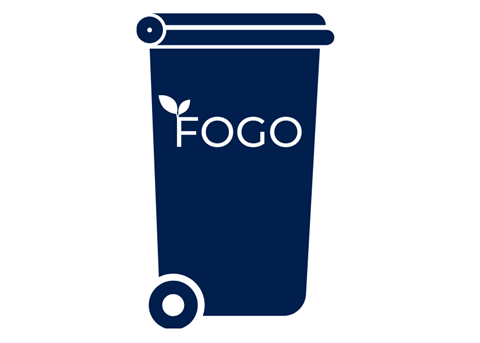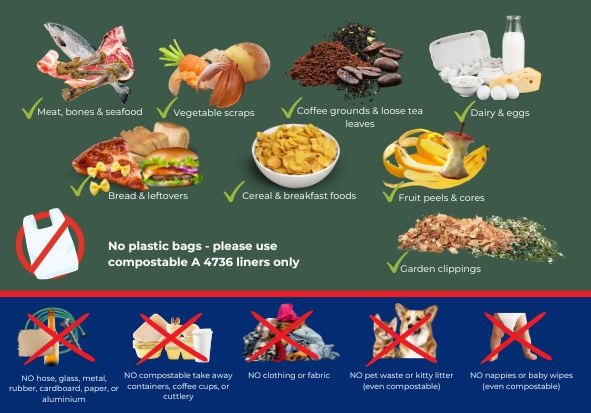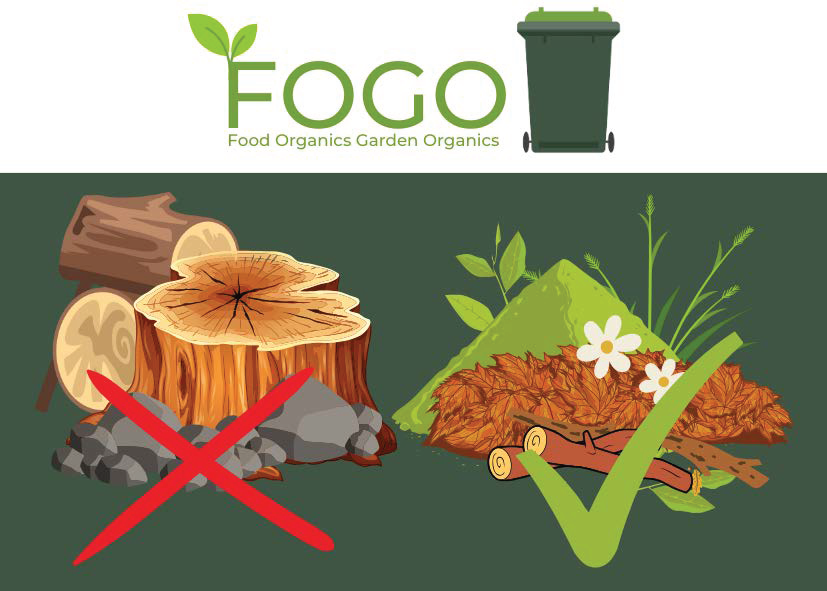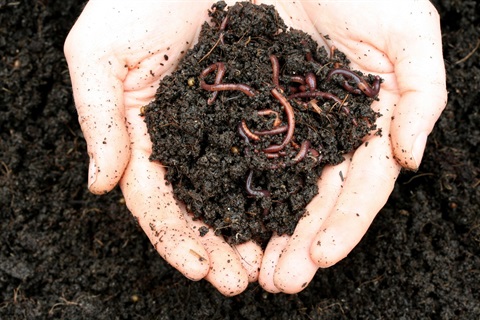Food Organics Garden Organics (FOGO)

FOGO stands for 'Food Organics Garden Organics' and refers to your lime-green lid kerbside bin. The Snowy Monaro region currently only has a FOGO service in our Cooma township. The great news is we are in the process of expanding this service Snowy Monaro wide.
You can put food scraps and garden clippings into your FOGO bin.
Your food scraps can be bagged, but ONLY in a Council-supplied or approved compostable bag with code AS 4736 . If you need more compostable bags please contact 1300 345 345 or call into our Cooma Council office or Cooma Landfill.
Please do not use plastic or biodegradable bags for your food waste. These do not break down and will result in contamination of your FOGO efforts.
What can I put into my FOGO bin?
The EPA has recently made changes to what can and cannot go into your FOGO bins. A good rule to remember is: if it grows, it goes!

The following is a comprehensive list of what can and cannot go into your FOGO bins.
YES
These items CAN go in your lime-green lid FOGO bins:
- Ash
- Bones
- Bread – any variety, crusts, stale or mouldy
- Cereal
- Coal - completely cooled
- Coffee grinds (without pods or other packaging)
- Compostable liners with Australian Standard AS4736 code – provided by Council
- Cooking oils/fats
- Dairy products
- Egg shells
- Feathers (only fresh plucked chicken feathers)
- Fish – bones, skin and scraps
- Flowers
- Food
- Fruit – peels, cores, seeds and scraps
- Garden organics – grass and clippings
- Grains
- Leaves
- Meat (white and red)
- Milk (including non-dairy milks)
- Mouldy food
- Nuts and seeds (including shells and husks)
- Pasta (cooked or uncooked)
- Rice (cooked or uncooked)
- Sauces such as tomato sauce or relishes (without packaging)
- Seafood and shells
- Tea (loose-leaf only)
- Vegetables – peels, cores, seeds and scraps
NO
These items CANNOT go in your lime-green lid FOGO bins:
- Adhesive labels and tape
- Baking paper
- Biodegradable plastic bags
- Cardboard
- Cartons, such as milk or juice cartons
- Ceramics
- Certified compostable packaging, cutlery, containers, cups, straws, stirrers
- Clothes or textiles
- Compostable liners that don’t have the Australian standard AS4736
- Corks (any type)
- Dust
- Food in containers (food can go in FOGO, not containers)
- Glass bottles and jars
- Green/eco/calico/hessian/reusable bags
- Hair – human or pet
- Household waste (general rubbish)
- Leather products – bags, shoes, other
- Magazines
- Metal tins or cans
- Nappies (including compostable ones)
- Paper
- Paper towels
- Paper bags
- Pet waste and kitty litter
- Pizza boxes
- Plant pots
- Plastic bags
- Rocks
- Soil
- Tissues and toilet paper
- Treated wood
- Vacuum waste
- Wipes (including compostable ones)
Green Waste
What can I do with my green waste?
If you have large amounts of garden green waste, please drop it off at one of the Council waste facilities that accept this type of waste. Small processing fees apply. See fees and charges HERE for more information.
If you live in Cooma and are eligible to receive a Food Organics Garden Organics (FOGO) collection, you can place your household green waste and food scraps together in the your lime-green lid bin.
Please be mindful that large stumps, logs and rocks cannot go into your FOGO bin.

Composting and worm farms

Almost half of the general household waste that we throw into the bin is food and garden waste. These materials can be used to make compost to benefit your garden. Compost is natural, inexpensive and is good for the environment. By turning food scraps and garden vegetation into compost you can:
- Improve soil quality and garden vitality
- Conserve water
- Recycle valuable nutrients and reduce the use of artificial fertilisers
- Prevent CO2 and methane gas emissions, and reduce landfill impacts from wasted food and garden vegetation
Handy Guides for Composting, Worm Farming and Mulch